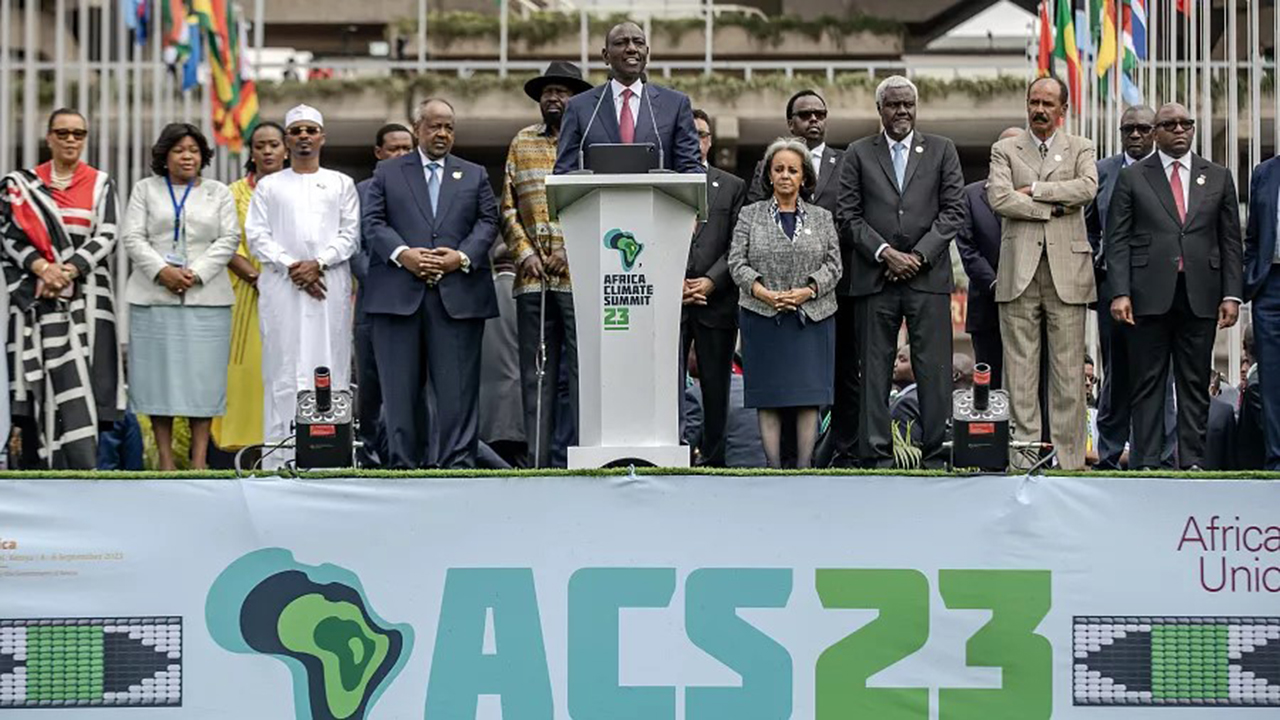A Landmark Africa Climate Summit ended last week with a combined investment commitment of nearly $26 billion from the public and private sectors, multilateral development banks, and philanthropic foundations, as well as other partners in the development financing community.
The historic adoption of the Nairobi Declaration piloted by the Chairman, of the Committee of African Heads of State and Government on Climate Change (CAHOSCC) and President, of the Republic of Kenya, Williams Ruto is expected to point out Africa’s position at COP 28 talks in the oil-rich United Arab Emirates, by outlining a number of commitments to progressing towards net zero and meeting international climate goals on finance and adaptation.
Signed by 19 African Heads of State, the declaration includes calls to reform the multilateral financial system and global financial architecture; for world leaders to rally behind a global carbon taxation regime, and for the establishment of a new financing architecture that is responsive to Africa’s needs including debt restructuring and relief, as well as establishment of a new Global Climate Finance Charter.
READ ALSO: Shelter Afrique advocates for climate-resilient, affordable housing at Africa Climate Summit
In the eight-page text, African leaders pointed to the need to ensure clean economic development for a continent, whose population is set to double by 2050, and quadruple by 2100, to achieve global carbon neutrality by mid-century and contain temperature rises to below 1.5°C, or even 2°C.
“We are committed to driving economic growth and job creation in Africa in a way that not only limits our emissions but contributes to global decarbonization efforts,” they declared.
The declaration noted that while the continent has 40 percent of the world’s renewable energy capacity, it still attracts only a marginal fraction of investment. At the same time, 600 million people are still deprived of access to electricity, and almost a billion people depend on forest and agricultural residues to cook their food. The text also underlines the role played by the forests of the Congo Basin in stabilizing the climate and biodiversity.
Africa attracted only two percent of global spending on renewables over the last decade, according to the leaders’ statement. But it said the continent would need a “tenfold increase in the finance capital flowing” into renewables in the next seven years, some $600 billion, to achieve the aim of boosting renewables from 56 gigawatts (GW) in 2022 to at least 300 GW by 2030.
“Africa possesses both the potential and the ambition to be a vital component of the global solution to climate change,” said the final declaration from the meeting, on behalf of the African Union.

But, it warned, unlocking green growth across the continent “on a scale that can contribute meaningfully to the decarbonization of the global economy” required a massive scaling up in funding. It called on the international community to ease Africa’s crushing debt burden and reform the global financial system to unblock investment in clean energy.
In response, UN Climate Change High-Level Champion for COP28, Razan Al Mubarak, said: “I welcome the commitment by Heads of State to strengthen actions to halt and reverse biodiversity loss, deforestation, desertification and restore degraded lands to achieve land degradation neutrality. I also welcome the implementation of the African Union Biodiversity Strategy and Action Plan.”
READ ALSO: UK Launches Climate Change Programme Targeting Over 4 Million Nigerians
MEANWHILE, Nigeria’s President, Bola Tinubu, who was represented by the Minister of Environment, Mr. Iziak Salako, said the country needs $17.7 billion yearly to achieve its Nationally Determined Contribution (NDC) unconditional pledges by 2030.
Tinubu said that the country has designed an ambitious Energy Transition Plan (ETP) to achieve universal access to energy by 2030 and net-zero emissions by 2060 while prioritizing industrialization, job creation, and economic growth, which translates to additional financing requirements translates to about $10 billion per year, but that average international financing flows to Nigeria for clean energy have been about $655 million per year over the past decade.
“Significantly, our plan helps to crystallize the scale of resources needed to deliver climate targets, and it is clear that current financial flows will not suffice. Nigeria’s ETP requires $1.9 trillion spending up to 2060, including $410 billion above business-as-usual spending,” he said.
Also, climate activists have applauded African leadership for scaling up renewable energy and supported the call by governments for additional financial and technological support.
At the same time, they raised concerns over false solutions and the push for fossil gas by all and African Development Bank’s Akinwumi Adesina during a high-level opening, citing the urgency of the just energy transition to renewable energy to avert the worst impacts of the climate crisis.
While welcoming the promises for greater renewable energy deployment, activists in addition called for commitment towards the tripling of global renewable energy capacity, to 11,000 Gigawatt by 2030, the level required to limit global heating to 1.5 degrees Celsius.
Source: Guardian




